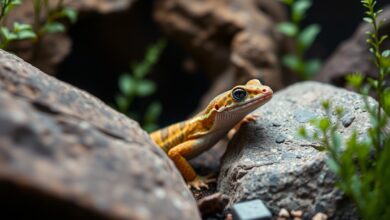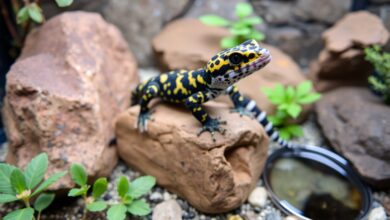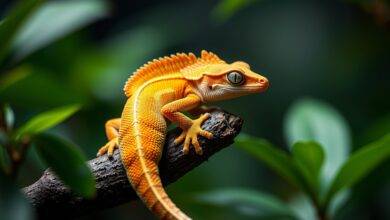Fruits Crested Geckos Can Eat – Safe and Healthy Options
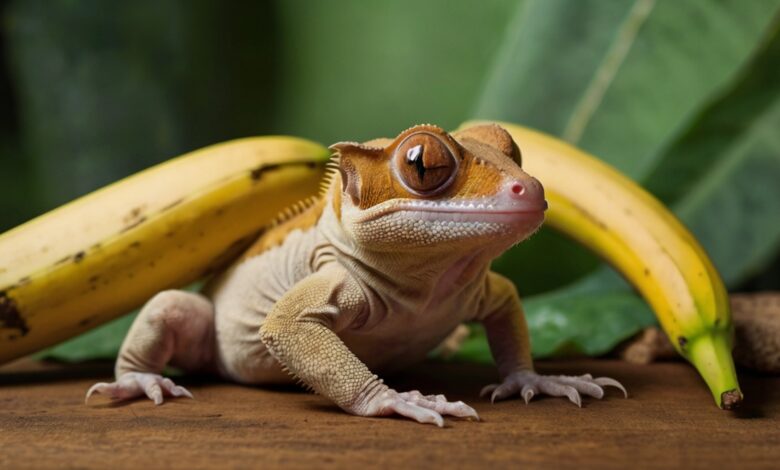
Just like you enjoy a variety of fruits, your Crested Gecko can also benefit from a range of tasty treats! It’s important to provide safe and healthy options that stimulate their appetite and contribute to their well-being. In this blog post, you’ll discover which fruits are enjoyable for your gecko, as well as the ones to avoid for their safety. By choosing the right fruits, you can help ensure your pet remains happy and healthy!
Key Takeaways:
- Variety is important: Crested geckos benefit from a diverse diet that includes different types of fruits to meet their nutritional needs.
- Safe fruits: Fruits such as mashed bananas, pureed peaches, and soft melons are excellent options that provide vital vitamins and hydration.
- Avoid toxins: Be cautious and avoid feeding geckos fruits that are toxic to them, including citrus fruits and avocados.
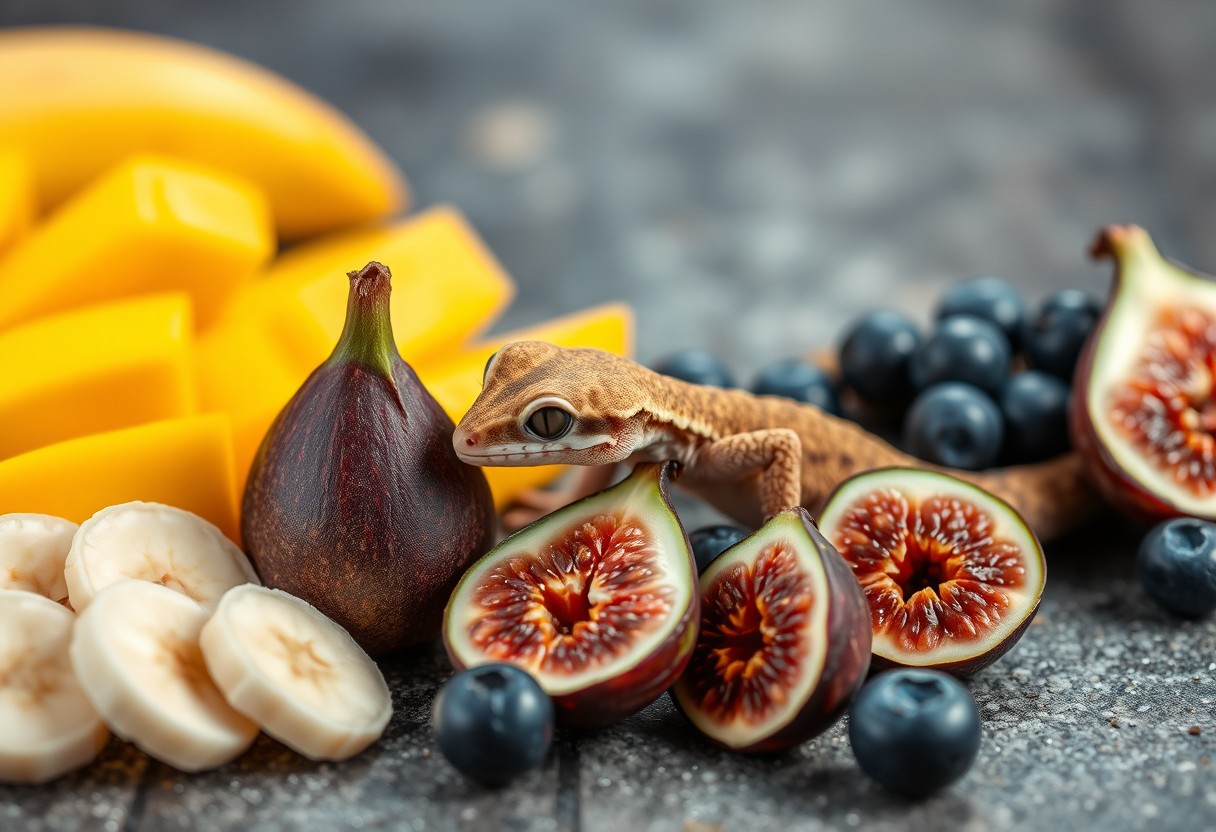
Understanding the Diet of Crested Geckos
For optimal health and energy, you need to understand the diet of your crested gecko. These fascinating reptiles are primarily insectivorous but can also benefit from a mixed diet that includes fruits and commercial diets specifically formulated for their needs. This balanced approach ensures that your gecko receives the imperative nutrients required for growth, reproduction, and overall well-being.
Nutritional Needs
To keep your crested gecko healthy, it’s important to address their nutritional needs. They require a blend of proteins, vitamins, and minerals found in insects, fruits, and specialized gecko diets. By providing a well-rounded diet, you support their immune system, promote healthy skin, and enhance their vitality.
Importance of Variety
Around your crested gecko’s diet, variety plays a significant role in maintaining their health. Offering a mix of different fruits, insects, and prepared diets will not only cater to their nutritional needs but also stimulate their appetite and encourage foraging behavior.
Crested geckos are more likely to thrive when you offer them a diverse diet. By incorporating various fruits and insects, you expose your pet to imperative vitamins and minerals that promote overall well-being. This variety helps prevent dullness in their appetite and minimizes the risk of nutritional deficiencies. Additionally, rotational feeding can make mealtime enjoyable for your gecko, encouraging natural behaviors that keep them mentally stimulated and active.
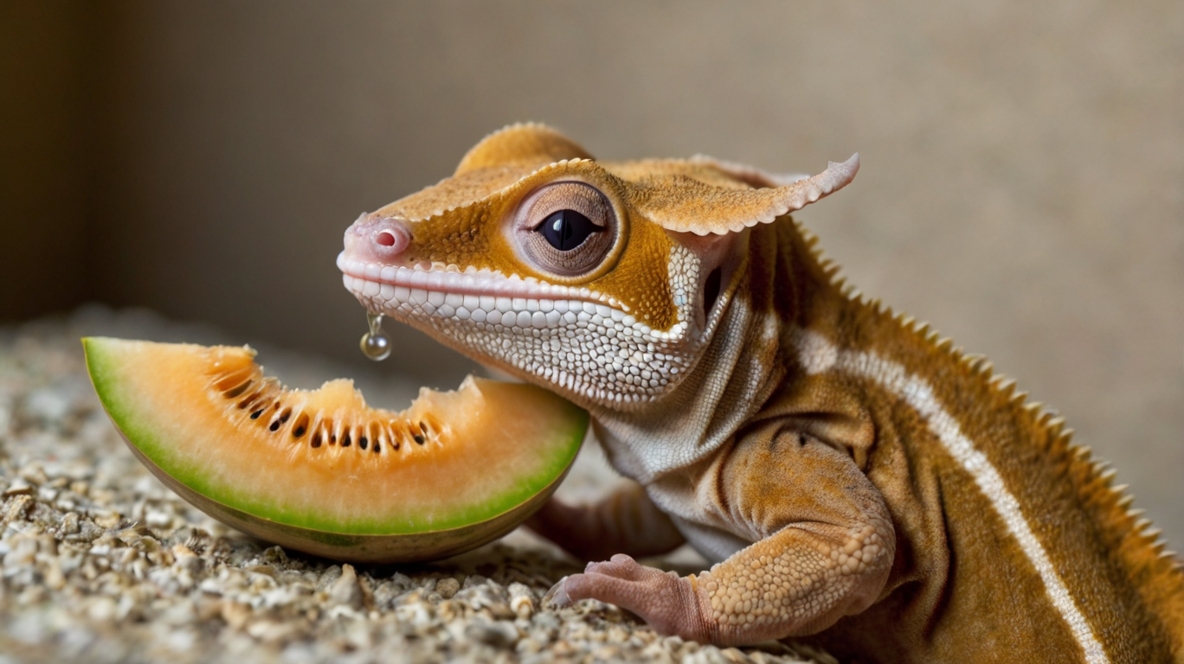
Safe Fruits for Crested Geckos
Even though crested geckos primarily thrive on a diet of insects and specialized diets, they can enjoy a variety of fruits in moderation. Safe options include bananas, mangoes, and pureed apples. For more details on what fruits can a crested gecko eat?, it’s imperative to research which fruits are both safe and nutritious.
Recommended Options
To provide your crested gecko with a balanced diet, consider offering fruits like papaya, blueberries, and figs. These fruits are not only safe but also packed with vitamins and minerals that can support your gecko’s health.
Fruits to Avoid
For optimal health, stay clear of certain fruits that can be harmful to your crested gecko. Fruits like citrus, grapes, and avocados pose risks and should be excluded from their diet.
Avoid feeding your crested gecko any fruits that are highly acidic, such as citrus fruits like oranges and lemons, which can irritate their digestive system. Additionally, grapes and avocados are toxic and can potentially lead to serious health issues. Always prioritize safety by sticking to the safe fruit options to ensure your reptile thrives.
Preparing Fruits for Feeding
To ensure your crested gecko enjoys healthy fruits, you must prepare them properly. Fresh, ripe fruits should be selected, as they provide more nutritional benefits. Always avoid processed or sugary fruits, as these can negatively impact your gecko’s health. Additionally, it’s important to introduce new fruits gradually to monitor your pet’s reactions and preferences. By taking these steps, you can create a balanced diet for your gecko, enhancing its vitality and wellbeing.
Proper Cleaning and Cutting
Among the first steps in preparing fruits for your crested gecko is proper cleaning and cutting. Always wash fruits thoroughly under running water to remove pesticides and dirt. After cleaning, chop the fruits into small, manageable pieces that your gecko can easily consume. This ensures that your pet can enjoy its meals without the risk of choking or difficulty handling large chunks.
Feeding Techniques
Around feeding time, it’s vital to use effective techniques to encourage your crested gecko to eat the prepared fruits. Place the fruit pieces in a shallow dish or on a flat surface to make foraging easier. Additionally, you can use your finger to gently urge your gecko towards the fruit, enticing it to explore new tastes. Monitor your gecko’s eating habits carefully, as loss of interest could indicate an issue. If your gecko enjoys fruit but doesn’t eat much, consider mixing in different safe fruits to maintain a varied diet.
And keep in mind that each crested gecko has unique preferences regarding fruit. Always offer a variety while paying attention to which ones your pet enjoys most. Ensuring that the fruits are fresh and free from chemicals is vital for your gecko’s health. By establishing a consistent feeding routine, you can help your pet maintain a balanced diet and a happy, thriving lifestyle. Avoid introducing any dangerous or toxic fruits to their diet, as this could lead to serious health complications.
Incorporating Fruits into the Diet
Despite being insectivores, crested geckos can enjoy a variety of fruits as part of their diet. Incorporating fruits can enhance their nutritional intake and provide necessary vitamins. For more information on what fruits are safe for your crested gecko, check out What Fruit Can Crested Geckos Eat? 9 Safe Options – PangoVet. Be sure to select appropriate fruits that are safe and healthy for your pet to promote overall well-being.
Balanced Diet Considerations
To provide a well-rounded diet for your crested gecko, it’s vital to balance fruit offerings with other food sources. While fruits are a great source of hydration and nutrients, they should complement high-quality insect protein and commercial crested gecko diets. This balanced approach ensures your pet receives vital vitamins and minerals without excessive sugars from fruits.
Frequency of Fruit Feeding
On average, you should offer fruits to your crested gecko about once or twice a week. This frequency helps prevent overconsumption of sugars while still allowing your gecko to enjoy the benefits that fruits provide.
Frequency is a significant factor in maintaining your crested gecko’s health. Offering fruits too often can lead to issues such as obesity and metabolic disorders due to high sugar content. Providing fruits once or twice a week allows you to provide variety without compromising your pet’s health. Always pay attention to your gecko’s response and adjust accordingly, ensuring their diet remains balanced and nutritionally adequate.
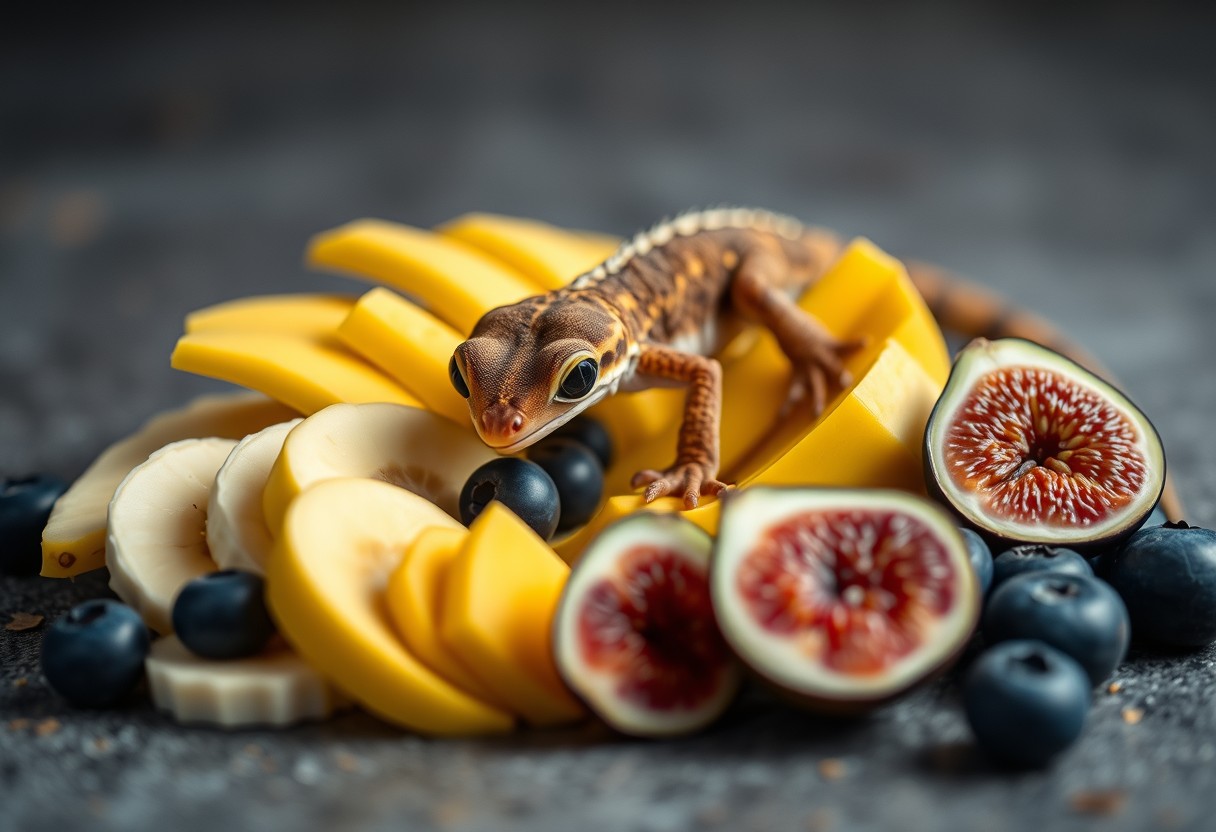
Signs of Healthy Eating Habits
Once again, observing your crested gecko’s eating habits can provide valuable insights into its health. A healthy gecko will display a consistent appetite, showing enthusiasm for a variety of fruits and diets you offer. You should also notice a good level of activity, vibrant colors, and an overall engaging demeanor which indicates proper nutrition. Keep an eye on your pet’s weight and general condition to ensure they are maintaining healthy eating habits.
Behavioral Indicators
One key behavioral indicator of healthy eating habits is your gecko’s willingness to explore and consume different food options. An adventurous and curious gecko that actively seeks out fruit and other safe foods demonstrates an eagerness to eat, which typically reflects a healthy appetite. If your pet suddenly becomes disinterested in food, it may be a signal to investigate further.
Physical Health Check
Against common misconceptions, physical health is often a direct reflection of your crested gecko’s eating habits. Weight, shedding, and overall vitality are imperative factors to consider. Regular checks will help you determine if your gecko is thriving or experiencing issues.
But a thorough physical health check goes beyond just looking at your gecko’s weight. You should assess the quality of their skin and sheds; healthy geckos have smooth, vibrant skin and shed their skin regularly without issues. Pay attention to bulging or sunken eyes, which can indicate dehydration or other health problems. Additionally, a well-fed gecko will have a healthy, plump appearance rather than being overly thin or showing signs of distress. Keeping a close watch ensures you can identify any problems promptly and take necessary action.
Common Misconceptions About Crested Gecko Diets
After delving into the diets of crested geckos, many owners are surprised by the misconceptions that surround their nutritional needs. It’s necessary to educate yourself on what your pet should eat by checking out resources like the Crested Gecko Complete Food Guide. These myths can lead to unintentional harm, resulting in a lack of necessary nutrients or even health issues for your pet.
Myth vs. Fact
An all-fruit diet is often believed to be sufficient for crested geckos; however, this is a misconception. While fruits are enjoyable treats, they should only make up a small portion of your gecko’s overall diet. A balanced diet rich in protein and calcium is necessary for their health and longevity.
Clarifying Confusion
Fact: Many owners mistakenly think that providing a variety of fruits will meet their crested gecko’s dietary needs. In fact, relying solely on fruits can lead to nutritional deficiencies, as these animals require a well-rounded diet, including specialized commercial diets that are designed to meet their unique needs. Additionally, offering inappropriate foods could result in serious health issues, underscoring the importance of understanding the right mix of nutrients for your pet’s well-being.
To wrap up
Presently, ensuring that your Crested Geckos enjoy a balanced diet rich in safe and healthy fruits is crucial for their overall well-being. You can offer options like mashed bananas, pureed mangoes, and soft strawberries to provide nutrients while keeping their meals enjoyable. Always ensure the fruits are fresh and appropriately prepared, as this will help your geckos thrive. By incorporating a variety of these tasty fruits, you enhance their diet and promote a vibrant, healthy life for your pets.
FAQ
Q: What fruits are safe for crested geckos to eat?
A: Crested geckos can enjoy a variety of fruits that are safe for their consumption. Some of the best options include mashed bananas, pureed mango, and apples (without seeds). Other fruits such as pears, figs, and berries can also be offered in moderation. It’s crucial to provide fruits that are ripe and cut into small, manageable pieces to make it easier for your gecko to consume them.
Q: How often should I feed my crested gecko fruits?
A: Fruits should be included in your crested gecko’s diet as a supplement rather than the primary food source. Offering fruits once or twice a week is ideal, allowing you to provide a well-rounded diet. The primary diet should consist of high-quality commercial crested gecko food, with fruits serving as a treat or addition to ensure variety and enrichment in their diet.
Q: Are there any fruits that crested geckos should avoid?
A: Yes, certain fruits should be avoided when feeding crested geckos. Citrus fruits like oranges, lemons, and limes can cause digestive issues and should not be included in their diet. Additionally, stone fruits such as cherries and peaches contain pits that may be harmful. Always avoid feeding your crested gecko any fruits that are moldy, overripe, or contain additives and sugar, as these can lead to health problems.


